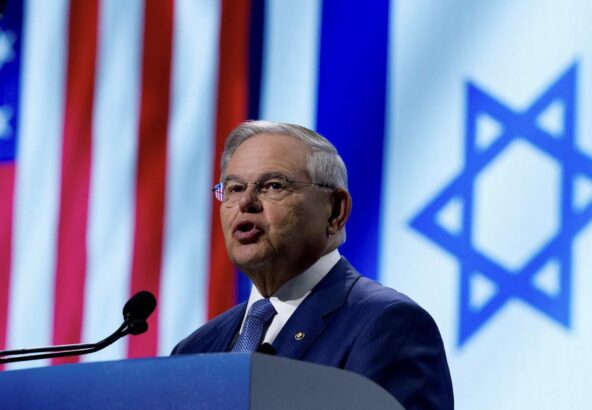Menendez is perhaps the Democratic Party’s most stalwart supporter of Israel, enjoying a decades-long relationship with AIPAC and the pro-Israel lobby. This positioning, combined with his chairmanship of the crucial Senate Foreign Relations Committee, have led him to be among the most influential senators concerning Israel policy
By Ben Samuels, reposted from Ha’aretz, September 25, 2023
News of Sen. Robert Menendez’s indictment on charges of secretly aiding Egypt’s authoritarian government, among other corruption accusations that alleged he parlayed his foreign affairs influence for personal gain, has taken Washington by storm over the past 72 hours.
The developments, which have already led the New Jersey senator to relinquish his chairmanship of the Senate Foreign Relations Committee, will have dramatic implications on Israel’s standing in Congress (though Israel is not mentioned in the 39-page indictment).
Menendez is perhaps the Democratic Party’s most stalwart supporter of Israel, enjoying a decades-long relationship with AIPAC and the pro-Israel lobby. This positioning, combined with his chairmanship of the crucial committee, have led him to be among the most influential senators concerning Israel policy.
To that end, pro-Israel megadonors from both political parties like Sheldon and Miriam Adelson, Haim Saban, Mortimer Zuckerman and Seth Klarman donated more than $1.5 million dollars to his 2015 defense fund aimed at combatting unrelated corruption charges.
This, on one hand, has manifested in decades of unvarnished support — including being one of four Democratic senators to vote against the 2015 Iran nuclear deal. He similarly said last year that he would oppose reentry into the JCPOA at a time when the Biden administration was approaching a revised agreement.
On the other, Menendez has been among the Democrats to voice concerns in recent years about Israel’s increasingly politicized standing in Washington, as well as its rightward shift at home, forecasting Israel’s evolving positions within the Democratic Party.
This first notably manifested when he offered rare criticism of Israel’s conduct in the 2021 Gaza war, specifically after striking a building in Gaza City that housed offices of The Associated Press and Al-Jazeera.

His criticism of Israeli conduct caused more concern among Israeli officials than any other of the then-unprecedented criticism emerging from Congress amid Israel’s military campaign.
“We must do what friends do: Stand by them when they are under attack and speak the truth,” Menendez told Israel Policy Forum after the war. “We must find the nuance; we are capable of doing so. And we owe it to our own values and the values have formed the basis of that friendship.”
He would later slam Republicans for attempting to fast-track legislation prohibiting U.S. aid to Gaza, stating that such efforts to use the U.S.-Israel relationship for “partisan political purposes” do harm to both countries.
While Menendez has veered closer to Republican talking points concerning the judicial overhaul, insisting that Israel is a democracy that makes its own decisions, he notably warned Prime Minister Benjamin Netanyahu about Itamar Ben-Gvir’s potential inclusion in a governing coalition last year.
Menendez’s warnings about the adverse effects of the Kahanist’s inclusion in Netanyahu’s government foreshadowed the unprecedented uproar that has emerged from U.S. lawmakers and the Jewish community over the far-right coalition’s rhetoric and subsequent policy positions.
While Menendez has insisted he will not resign despite calls from an increasing number of local and national lawmakers, his looming departure only stands to remove a key Democrat holding the line in keeping Israel from evolving into even more of a political football.
This dynamic will become more relevant as the U.S., Israel and Saudi Arabia continue to move toward a potential landmark normalization pact, which requires Senate ratification.
Menendez has not been shy in his criticism of Saudi Arabia in recent years, calling for a freeze in U.S.-Saudi cooperation over its empowerment of Russia’s actions in Ukraine. He also vowed not to green-light any cooperation with Riyadh until it reassessed its position on Ukraine.
His vote on a potential deal, already crucial given the intensely narrow margins within which Biden is operating, has only become all the more significant given his outsized foreign policy influence among hawkish Democrats and pro-Israel lawmakers from both parties.
He met with Egyptian President Abdel Fattah Al-Sissi last month in Egypt to discuss the Israel-Saudi efforts – particularly relevant given Egypt’s influence over the Gaza Strip and security enforcement in the Sinai Peninsula.
The meeting, however, has taken on new scrutiny and significance given the details of the indictment, which allege that he and his wife received bribes for pushing military aid to Sissi’s regime despite its failing human rights record and growing calls among Democrats to halt aid.
FURTHER READING ON CONGRESS AND ISRAEL:
- Israel Lobby list
- Congress’ ‘Israel Normalization Act’ normalizes ethnic cleansing and impunity
- Congress has introduced over 70 pieces of Israel-centric legislation so far in 2021
- Israel on the defensive: Congress members demonstrate their true allegiance
- Schumer, ‘guardian of Israel,’ calls anti-Zionism a form of antisemitism [videos]
- The Fall of Eliot Engel: Israel-Firster Defeated in Congressional Primary
VIDEOS:





